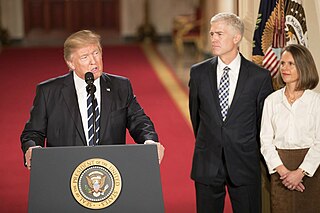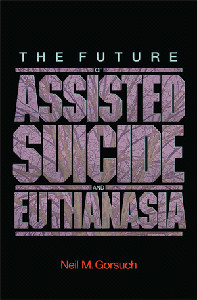Euthanasia is the practise of intentionally ending life to eliminate pain and suffering.

A victimless crime is an illegal act that typically either directly involves only the perpetrator or occurs between consenting adults. Because it is consensual in nature, whether there involves a victim is a matter of debate. Definitions of victimless crimes vary in different parts of the world and different law systems, but usually include possession of any illegal contraband, recreational drug use, prostitution and prohibited sexual behavior between consenting adults, assisted suicide, and smuggling among other similar infractions.

Assisted suicide – alternately referred to as medical aid in dying – means a procedure in which people take medications to end their own lives with the help of others, usually medical professionals. The term usually refers to physician-assisted suicide (PAS), which is an end of life measure for a person suffering a painful, terminal illness. Once it is determined that the person's situation qualifies under the physician-assisted suicide laws for that location, the physician's assistance is usually limited to writing a prescription for a lethal dose of drugs.
The right to die is a concept based on the opinion that human beings are entitled to end their life or undergo voluntary euthanasia. Possession of this right is often understood that a person with a terminal illness, incurable pain, or without the will to continue living, should be allowed to end their own life, use assisted suicide, or to decline life-prolonging treatment. The question of who, if anyone, may be empowered to make this decision is often the subject of debate.

John Mitchell Finnis is an Australian legal philosopher and jurist specializing in jurisprudence and the philosophy of law. He is an original interpreter of Aristotle and Aquinas, and counts Germain Grisez as a major influence and collaborator. He has made contributions to epistemology, metaphysics, and moral philosophy.
Voluntary euthanasia is the ending of a person's life at their request in order to relieve them of suffering. Voluntary euthanasia and physician-assisted suicide (PAS) have been the focus of intense debate in recent years.
Gonzales v. Oregon, 546 U.S. 243 (2006), was a landmark decision of the US Supreme Court which ruled that the United States Attorney General cannot enforce the federal Controlled Substances Act against physicians who prescribed drugs, in compliance with Oregon state law, to terminally ill patients seeking to end their lives, commonly referred to as assisted suicide. It was the first major case heard by the Roberts Court under the new Chief Justice of the United States.

Neil McGill Gorsuch is an American jurist who serves as an associate justice of the Supreme Court of the United States. He was nominated by President Donald Trump on January 31, 2017, and has served since April 10, 2017.
Involuntary Euthanasia is currently illegal in all 50 states of the United States. Assisted suicide is legal in 10 jurisdictions in the US: Washington, D.C. and the states of California, Colorado, Oregon, Vermont, New Mexico, Maine, New Jersey, Hawaii, and Washington. The status of assisted suicide is disputed in Montana, though currently authorized per the Montana Supreme Court's ruling in Baxter v. Montana that "nothing in Montana Supreme Court precedent or Montana statutes [indicates] that physician aid in dying is against public policy."
Non-voluntary euthanasia is euthanasia conducted when the explicit consent of the individual concerned is unavailable, such as when the person is in a persistent vegetative state, or in the case of young children. It contrasts with involuntary euthanasia, when euthanasia is performed against the will of the patient.

The legality of euthanasia varies depending on the country. Efforts to change government policies on euthanasia of humans in the 20th and 21st centuries have met limited success in Western countries. Human euthanasia policies have also been developed by a variety of NGOs, most notably medical associations and advocacy organizations. As of 2023, euthanasia is legal in Belgium, Canada, Colombia, Ecuador, Luxembourg, the Netherlands, New Zealand, Portugal, Spain and all six states of Australia. Euthanasia was briefly legal in the Northern Territory between 1996 and 1997, but was overturned by a federal law. In 2021, a Peruvian court allowed euthanasia for a single person, Ana Estrada.
Suicide tourism, or euthanasia tourism, is the practice of potential suicide candidates travelling to a jurisdiction to die by suicide or assisted suicide which is legal in some jurisdictions, or the practice of travelling to a jurisdiction in order to obtain drugs that can aid in the process of ending one's own life.

Assisted suicide is suicide with the aid of another person. In the United States, the term "assisted suicide" is typically used to describe what proponents refer to as medical aid in dying, in which terminally ill adults are prescribed and self-administer barbiturates if they feel that they are suffering significantly. The term is often used interchangeably with physician-assisted suicide (PAS), "physician-assisted dying", "physician-assisted death", "assisted death" and "medical aid in dying" (MAiD).

Euthanasia in Canada in its legal voluntary form is called Medical Assistance in Dying (MAiD) and it first became legal along with assisted suicide in June 2016 for those whose death was reasonably foreseeable. In March 2021, the law was further amended by Bill C-7 which to include those suffering from a grievous and irremediable condition whose death was not reasonably foreseeable. According to the Fourth Annual Report on MAID, there were 13,241 MAID deaths reported in Canada in 2022.
Involuntary euthanasia, typically regarded as a type of murder, occurs when euthanasia is performed on a person who would be able to provide informed consent, but does not, either because they do not want to die, or because they were not asked.
Critics of euthanasia sometimes claim that legalizing any form of the practice will lead to a slippery slope effect, resulting eventually in non-voluntary or even involuntary euthanasia. The slippery slope argument has been present in the euthanasia debate since at least the 1930s.
Steven Lubet is a legal scholar and author. Lubet is the Edna B. and Ednyfed H. Williams Memorial Professor of Law at Northwestern University.

On January 31, 2017, soon after taking office, President Donald Trump, a Republican, nominated Neil Gorsuch for Associate Justice of the Supreme Court of the United States to succeed Antonin Scalia, who had died almost one year earlier. Then-president Barack Obama, a Democrat, nominated Merrick Garland to succeed Scalia on March 16, 2016, but the Republican-controlled U.S. Senate did not vote on the nomination. Majority leader Mitch McConnell declared that as the presidential election cycle had already commenced, it made the appointment of the next justice a political issue to be decided by voters. The Senate Judiciary Committee refused to consider the Garland nomination, thus keeping the vacancy open through the end of Obama's presidency on January 20, 2017.
The Euthanasia Society of America was founded on January 16, 1938, to promote euthanasia. It was co-founded by Charles Francis Potter and Ann Mitchell. Alice Naumberg also helped found the group.
The Anscombe Bioethics Centre is a Catholic academic institute based in Oxford, which engages in scholarship, public debate, and education. Established in 1977, it is the oldest bioethical research institution in the United Kingdom.








